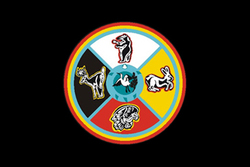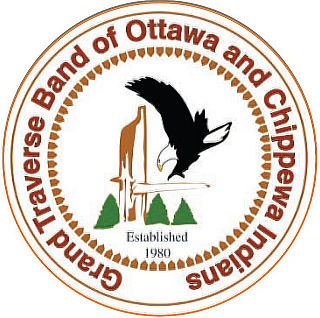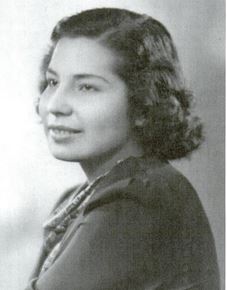
The Upper Peninsulaof Michigan – also known as Upper Michigan or colloquially "the UP" – is the northern of the two major peninsulas that make up the U.S. state of Michigan. It is bounded primarily by Lake Superior to the north, separated from the Canadian province of Ontario at the east end by the St. Marys River, and flanked by Lake Huron and Lake Michigan along much of its south. The Straits of Mackinac separate it from the Lower Peninsula of Michigan to the south. Although the peninsula extends as a geographic feature into the state of Wisconsin, the state boundary follows the Montreal and Menominee rivers and a line connecting them.

Mackinac County is a county in the Upper Peninsula of the U.S. state of Michigan. As of the 2010 census, the population was 11,113. The county seat is St. Ignace. Formerly known as Michilimackinac County, in 1818 it was one of the first counties of the Michigan Territory, as it had long been a center of French and British colonial fur trading, a Catholic church and Protestant mission, and associated settlement.

Chippewa County is a county in the Upper Peninsula of the U.S. state of Michigan. As of the 2010 census, the population was 38,520. The county seat is Sault Ste. Marie. The county is named for the Ojibwe (Chippewa) people, and was set off and organized in 1826.

Sault Ste. Marie is a city in, and the county seat of, Chippewa County in the U.S. state of Michigan. It is on the northeastern end of Michigan's Upper Peninsula, on the Canada–US border, and separated from its twin city of Sault Ste. Marie, Ontario, by the St. Marys River. The city is relatively isolated from other communities in Michigan and is 346 miles from Detroit. The population was 14,144 at the 2010 census, making it the second-most populous city in the Upper Peninsula. By contrast, the Canadian Sault Ste. Marie is much larger, with more than 75,000 residents, based on more extensive industry developed in the 20th century and an economy with closer connections to other communities.

Saint Ignace, usually written as St. Ignace, is a city near the tip of the Upper Peninsula of the US state of Michigan, on the northern side of the Straits of Mackinac. It sits on the shore of Lake Huron at the north end of the Mackinac Bridge, opposite Mackinaw City, serving as the gateway to the UP for travelers coming from the Lower Peninsula. It is one of two ports with ferry service to Mackinac Island, and is the only mainland city accessible from the island when Lake Huron is frozen over. St. Ignace Township is located just to the north of the city, but is politically independent.

Manistique, formerly Monistique, is the only incorporated city in and the county seat of Schoolcraft County of the U.S. state of Michigan's Upper Peninsula. As of the 2010 census, the city population was 3,097. The city lies on the north shore of Lake Michigan, adjacent the southwest corner of Manistique Township. Manistique was founded where the Manistique River flows into Lake Michigan, forming a kind of natural harbor, which has since been improved with breakwaters, dredging, and a lighthouse. The city takes its name from the Manistique River. The economy also depends heavily on tourism.

The Bay Mills Indian Community (BMIC), known in Ojibwe as Gnoozhekaaning, is an Indian reservation forming the land base of one of the many Sault Ste. Marie bands of Chippewa Indians. The largest section of the reservation is located in Chippewa County, Michigan, approximately 15 miles (25 km) west-southwest of Sault Ste. Marie; it has land in both Bay Mills and Superior townships. A smaller section lies southeast of Sault Ste. Marie and encompasses Sugar Island, all contained within the Sugar Island Township.

The United States District Court for the Western District of Michigan is the federal district court with jurisdiction over of the western portion of the state of Michigan, including the entire Upper Peninsula.
H-63 is a county-designated highway (CDH) in the Upper Peninsula of the US state of Michigan. The highway parallels the Interstate 75 (I-75) corridor between St. Ignace and Sault Ste. Marie. The road is called Mackinac Trail after the Upper Peninsula branch of an Indian trail used before European settlers reached the area. Originally, the roadway was built as a section of US Highway 2 (US 2) before being added to the CDH system in the 1970s.

The Sault Ste. Marie Tribe of Chippewa Indians, commonly shortened to Sault Tribe of Chippewa Indians or the more colloquial Soo Tribe, is a federally recognized Native American tribe in what is now known as Michigan's Upper Peninsula. The tribal headquarters is located within Sault Ste. Marie, the major city in the region, which is located on the St. Marys River.

Greektown Casino-Hotel in Detroit, Michigan is one of three casino resort hotels in the city; a fourth is in Windsor, Ontario, in Canada, at the other end of the tunnel connecting the two cities. When this casino opened in 2000 in the Greektown Historic District, the federally recognized Sault Ste. Marie Tribe of Chippewa Indians held a majority interest. It was the only gaming casino in Detroit to be controlled by a Native American tribe.

The Grand Traverse Band of Ottawa and Chippewa Indians is a federally recognized Native American tribe located in northwest Michigan on the Leelaunau Peninsula. Sam McClellan is the current tribal chairman, elected in June 2016 to a four-year term after succeeding Al Pedwaydon, who served from 2012 to 2016.
Interstate 75 (I-75) is a part of the Interstate Highway System that runs north–south from Miami, Florida, to Sault Ste. Marie in the Upper Peninsula of the US state of Michigan. I-75 enters the state from Ohio in the south, north of Toledo, and runs generally northward through Detroit, Pontiac and Bay City, crosses the Mackinac Bridge, and ends at the Canadian border in Sault Ste. Marie. The freeway runs for approximately 396 miles (637 km) on both of Michigan's major peninsulas. The landscapes traversed by I-75 include Southern Michigan farmland, northern forests, suburban bedroom communities, and the urban core of Detroit. The freeway also uses three of the state's monumental bridges to cross major bodies of water. There are four auxiliary Interstates in the state related to I-75, as well as nine current or former business routes, with either Business Loop I-75 or Business Spur I-75 designations.
M-12 is a former state highway in the Upper Peninsula of Michigan. It was replaced in 1926 by:
Lac Vieux Desert Band of Lake Superior Chippewa is a band of the Lake Superior Chippewa, many of whom reside on the Lac Vieux Desert Indian Reservation, located near Watersmeet, Michigan. It is approximately 45 miles southeast of Ironwood, Michigan in Gogebic County.

The Mackinac Bands of Chippewa and Ottawa Indians is a state recognized tribe of Ojibwe and Odawa Native Americans, based in the state Michigan. The tribe is headquartered in St. Ignace and has around 4,000 enrolled members. Today most tribal members live in Mackinac, Emmet, Cheboygan, and Presque Isle counties. The tribe is headquartered in St. Ignace, Mackinac County.

Kewadin Casino, Hotel and Convention Center is a casino, hotel, and convention center in Sault Ste. Marie, Michigan which opened in November 1985. It is one of the Kewadin Casinos, which are all owned and operated by the Sault Tribe of Chippewa Indians.
Elizabeth Kronk Warner is Dean and Professor of Law at the S.J. Quinney College of Law at the University of Utah. She was previously a Professor of Law at the University of Kansas School of Law, where she was also an associate dean, and is a member of the Sault Tribe of Chippewa Indians. She is known for her work on Native American law, including its relations to climate change and same-sex marriage in Native American jurisdictions.

Waunetta McClellan Dominic was an Odawa rights activist who spent her career advocating for the United States government to adhere to its treaty obligations to Native Americans. She was one of the founders of the Northern Michigan Ottawa Association and her influence was widely recognized, especially after winning a 1971 claim against the government for compensation under 19th century treaties. She was also a proponent of Native American fishing rights being protected. In 1979, she was named by The Detroit News as "Michiganian of the Year" and in 1996, she was posthumously inducted into the Michigan Women's Hall of Fame.
The Treaty of Detroit of 1855 was a treaty between the United States Government and the Ottawa and Chippewa Nations of Indians of Michigan. The treaty contained provisions to allot individual tracts of land to Native people consisting of 40-acre (16 ha) plots for single individuals and 80-acre (32 ha) plots for families, outlined specific tracts which were assigned to the various bands and provided for the severance of the government consolidation of the Ottawa and Chippewa.

















